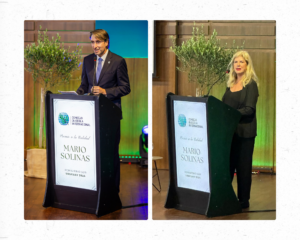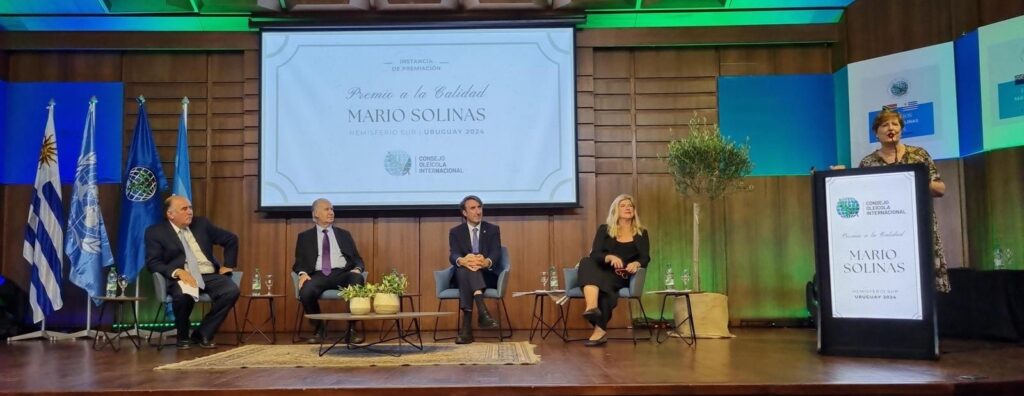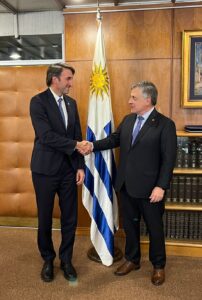Uruguay hosted the first Mario Solinas Quality Awards ceremony in the Southern Hemisphere
The prize-giving ceremony for the inaugural Mario Solinas Quality Awards, celebrating the highest quality extra virgin olive oils from the Southern Hemisphere, took place on Thursday, 7 November at the auditorium of Uruguay’s Technological Laboratory (LATU) in Montevideo. This milestone underscores the rapidly growing interest in the olive oil and table olive sector among Southern Hemisphere countries.
 The IOC’s non-profit, institutional and international Mario Solinas Quality Awards celebrated the winners and finalists of the Southern Hemisphere’s first edition. A total of twenty-six high-quality extra virgin olive oils from four countries—Argentina, Australia, Brazil, and Uruguay—were entered into the competition. Among the winning oils, Uruguay’s “Colinas de Garzón” and “Pique Roto” won the first prize in the robust green and ripe categories, respectively, while Argentina’s “Isanbaz IVC Obra Don Bosco” won the medium green category, and Brazil’s “Estância das Oliveiras – Viamão” took home the Mario Solinas recognition for the delicate green category (read more here).
The IOC’s non-profit, institutional and international Mario Solinas Quality Awards celebrated the winners and finalists of the Southern Hemisphere’s first edition. A total of twenty-six high-quality extra virgin olive oils from four countries—Argentina, Australia, Brazil, and Uruguay—were entered into the competition. Among the winning oils, Uruguay’s “Colinas de Garzón” and “Pique Roto” won the first prize in the robust green and ripe categories, respectively, while Argentina’s “Isanbaz IVC Obra Don Bosco” won the medium green category, and Brazil’s “Estância das Oliveiras – Viamão” took home the Mario Solinas recognition for the delicate green category (read more here).
Inaugurating the ceremony on behalf of the IOC Executive Secretariat were Executive Director Jaime Lillo and the Head of the Standardisation and Research Unit, Dr Mercedes Fernández, as well Gonzalo Aguirre, President of the Uruguayan Olive Association (ASOLUR), and Ruperto Long, LATU Director. The IOC highlighted the importance of promoting the production of high-quality extra virgin olive oils and underscored its commitment to fostering a globally sustainable olive sector, in alignment with which the Organisation launched the Mario Solinas Quality Awards in the Southern Hemisphere to accommodate differing harvest periods between hemispheres. The IOC representatives welcomed Uruguay’s dedication to developing its olive sector and encouraged other Southern Hemisphere countries to adhere to the International Agreement and join the IOC to advance high-quality olive oil production, protect consumers, and prevent trade barriers. Fernández took the opportunity to explain the technical process, rules, and categories of the competition, as well as to introduce the composition of the international jury for this inaugural southern hemisphere edition. Additionally, she visited some of the awarded oil mills on the sidelines of the ceremony.

The Mario Solinas ceremony was held in parallel to the ‘Second Latin American Congress on Olive Oil’ (CLAO by its Spanish acronym), organised with the patronage of the IOC by the Department of Food Science and Technology at the Faculty of Chemistry, University of the Republic (Uruguay) and the Federal University of Health Sciences of Porto Alegre (Brazil) from 8 to 9 November. The congress brought together experts in agronomy, technology, quality and health, and by-products and other applications, including researchers, industry professionals, and policymakers, to address the evolving challenges in Latin American olive cultivation.
Lillo participated in the opening ceremony alongside Uruguay’s Minister of Tourism, Eduardo Sanguinetti; the Dean of the Faculty of Chemistry, Álvaro Mombrú; and aforementioned Gonzalo Aguirre. In his remarks, the IOC Director commended Latin America’s impressive progress in the olive oil sector, noting the region’s accomplishments and quality improvements showcased by the recent Mario Solinas award winners.
 IOC Director Lillo and Uruguay’s Minister of Foreign Affairs, Omar Paganini, also took the opportunity to hold a bilateral meeting, reaffirming the need for international cooperation to sustainably support both Uruguay’s and the global olive sector.
IOC Director Lillo and Uruguay’s Minister of Foreign Affairs, Omar Paganini, also took the opportunity to hold a bilateral meeting, reaffirming the need for international cooperation to sustainably support both Uruguay’s and the global olive sector.
Uruguay has been an active member of the IOC Council of Members since 2013. Uruguay’s commitment to cultivating a vibrant olive oil sector is a testament to its dedication to quality and sustainability, and its close collaboration with the IOC reinforces its pivotal role in advancing the standards and international reach of high-quality olive oil in the Southern Hemisphere.










